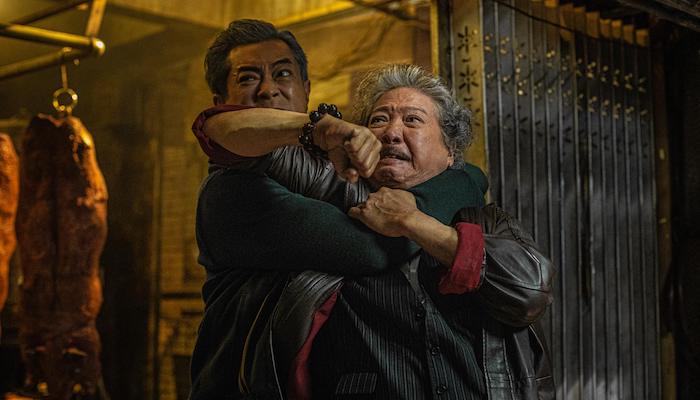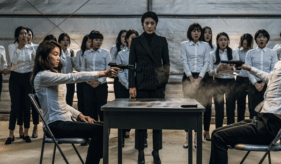Film Review: ORDINARY PERSON: The Slow Blade that Cuts Deep [NYAFF 2017]
Ordinary Person Review
Ordinary Person (2015) Film Review from the 16th Annual New York Asian Film Festival, a movie directed by Kim Bong-Han, starring Hyeon Ju-Son, Sang-Ho Kim, Hyuk Jang, Dal-Hwan Jo, Seung-Hyeon Ji, Man-Sik Jeong, Yoon-So Choi, Ji-il Park, and Mi-ran Ra.
Ordinary Person was a creeping political thriller, that may lull some viewers into not recognizing it as such, at first. It opens with a light-hearted touch, some life-in-progress character introductions, and three semi-distinct threads. Two of these were loosely connected by an old friendship; but there were three principal introductory threads, in all.
The first centered on old, grizzled Detective Kang Sung-Jin (Hyeon-ju Son). A simmering tempered, foul-mouthed, and cynical authoritarian, he had simple values (for a city cop), contempt for the nuances of micro-management, and a real problem with what he saw as the coddling of his peer tormented son. Had it not been for his genuine affection for his family, there wouldn’t really be any complexity to the man, at all.
The second thread helped with that. Investigative reporter, Chu Jae-jin (Sang-ho Kim), was the defiantly left-leaning Yin, to Kang’s Yang. In some ways, his social justice convictions had kept Kang honest (and more complex), over the course of their 30 year relationship; but somewhere between trouble brewing, over a major dam project, and his putting Kang on the spot, over an aborted frame-job attempt, Chu caught a whiff of something very big, and very dangerous, coming.
The third thread began as a subtle backdrop of socio-political maneuvering & management, centered on the machinations of Choi Gyu-nam (Hyuk Jang). A prosecutor-turned-intelligence operative, Choi displayed a Machiavellian level of ruthless poise & charm. Capable of flattery, insult, threat, or even violence without breaking a singularly serene expression, he was clearly sociopathic enough to go far in in his field.
The intersection of these threads came when a would be patsy, Kim Tae-Sang (Dal-hwan Jo), was identified as South Korea’s first serial killer. Besides establishing the base character, of Kang & Chu, and their diametric dynamic, the opening act left little doubt as to who the villain would be. This was no who-done-it mystery.
Once their respective convictions were called upon, Kang & Chu experienced a divide that Choi easily slipped into, exploited, and deepened – all with barely any conscious effort. Neither men even registered with Choi, as his world view was one of assets & threats – not people. Once that changed, however, the film took a definitively darker tone. Kim’s conditioning, at the hands of Kang – as he, himself, was being conditioned by Choi – would inevitably draw in Chu, for a three-sided conflict.
To make matters worse, Choi saw some of his conditioned control of Kang slip away before his very eyes, after a night of war veteran bonding, between Kang, and the Deputy Director of Choi’s department. A demonstration of Choi’s power & influence soon followed; but not before more damage was done to Kang & Chu’s relationship.
Between the perks of a direct line to the Deputy Director, and his inherently nationalist ideals, Kang tried keeping to merely following orders, where making a case against Kim was concerned. On top of that, those perks now gave him a personal reason to look the other way; so with his world-view narrower than ever, a real rift was opened between himself & Chu.
I appreciated certain minor details, like the dog with the short term memory nose, or the similarities between Kang’s family & work (the pathetic nature of both his son & Kim; the silent patience of his mute wife & one particular Kisaeng girl).
That said, there were certain details I also found familiar. The larger scheme, behind the plot, had a bit of China Town to it; and I’ve seen enough cynical Hollywood stuff to recognize a mole when I see one. These aren’t complaints, mind you – the paranoia inducing rigged system trope worked very well, here.
If Ordinary Person is to be taken at face value – that such an undercurrent of subtly Fascist State control exists, within the very framework of South Korea’s democracy – then it sort of makes me wonder if such a film could have even been made, contemporarily (it was set during the Cold War 80s). The cynical Hollywood stuff has been more critical about how the U.S. does business, since the 70s (when the Hoover/ McCarthy legacy started to wane); but social unrest – and government response – hasn’t been as heavy-handed as reports out of S. Korea has suggested things have been, there.
Considering that the film didn’t shy away from what an outside production might deem an insulting scene, regarding forgetful dog, 1st time Director Kim Bong-han’s film certainly benefits from S. Korea’s current level of freedom.
Even if the film does not reflect an actual reality to its setting, it certainly projects a point-of-view. V for Vendetta originally reflected one man’s concern, over the 1980s era rise of Neo-Conservatism (the Two Towers of Reagan & Thatcher), Robocop touched on concerns about the future of privatization, and Wag the Dog was a response to the growing influence of media management in U.S. politics. Except for Wag the Dog, none of those scenarios ever (fully) materialized; but they remain valuable cautionary tales.
The fact that advocates of such scenarios do exist is scary enough to warrant films like Ordinary Person; as does the fact that the ordinary person will always be the one to both suffer & overcome said scenarios.
The resolution to Ordinary Person will not pass for a happy ending, by some Western standards. However, the fact that it presents a lesson learned from the past, rather than a warning about our future, made it about as optimistic as Real World cautionary tales get, I figure.
Lesson duly noted.
Rating: 8/10
Leave your thoughts on this Ordinary Person review below, in the comments section. For more film reviews, visit our Movie Review Page, our Movie Review Facebook Page, and our Movie Review Google+ Page. Want up-to-the-minute notifications? FilmBook staff members publish articles by Email, Twitter, Tumblr, Google+, and Facebook.
Related Articles
FilmBook's Newsletter
Subscribe to FilmBook’s Daily Newsletter for the latest news!













